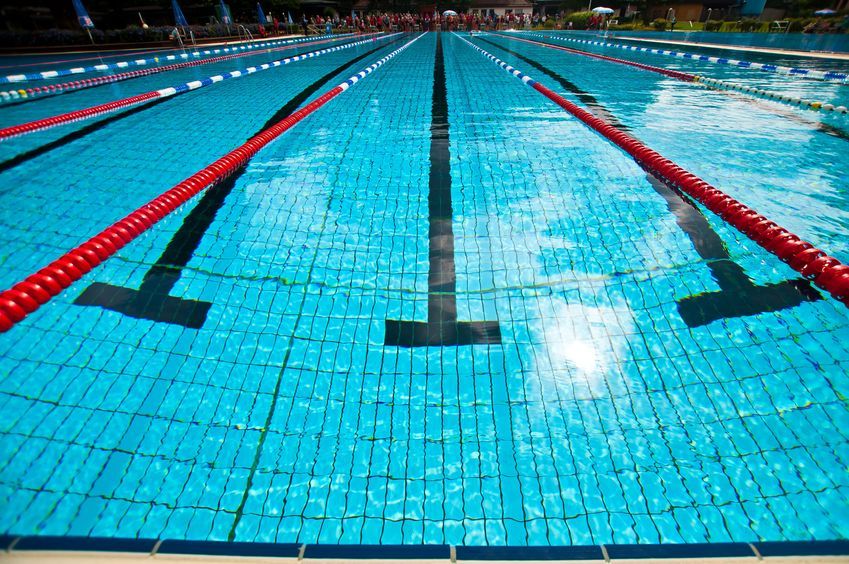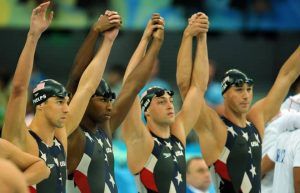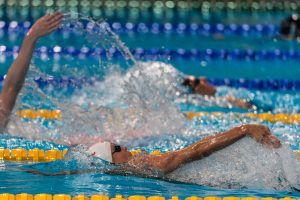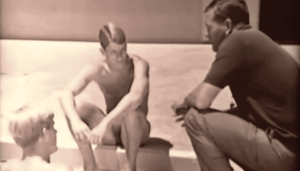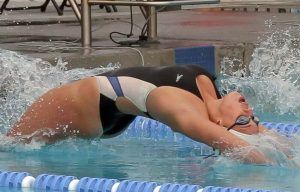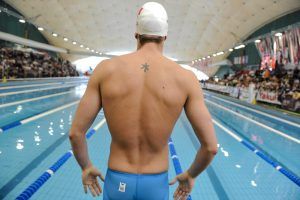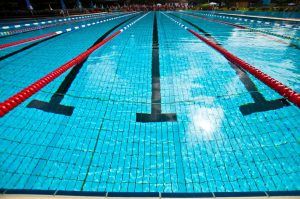The Summer Olympics that took place in the summer of 2012 was a special time for swimmers and the fans of the sport. The greatest swimmer of all time made his curtain call, while the next generation of athletes looking to chase his throne set the stage for an unbelievable week of competition.
Here are ten moments that captured our hearts and attention during that awesome week in London–
1. The Missile Runs into an A-Bomb.
Australia’s James Magnussen had been on a roll leading up to the London Games. He was defending world champion in the blue-ribbon event, the 100m freestyle, and his world leading time of 47.10 looked absolutely unbeatable. Bremerton, Washington’s Nathan Adrian would end up having something to say about that, out-touching the Aussie by 1/100th of a second at the finish, relegating the heavy favourite to second place.
2. Ye Shiwen Turns Heads and Raises Suspicions.
The performances of the Chinese women will always be viewed with a healthy dose of skepticism after the rampant and systemic doping during the early 1990’s. As a result, when Ye Shiwen, a previously unknown 16 year old not only won the 400m individual medley, but also out-split the men’s winner (Ryan Lochte of the USA) in the final 100m of freestyle, astonishment turned quickly to suspicion of foul play. Shiwen would also win the 200m individual medley, but so far her drug tests administered during the Games have come back negative.
3. Emergence of Ledecky and Franklin.
The Olympics often act as launching pads for the careers of swimmers, and nowhere was this more apparent than with two American teenagers, Missy Franklin and Katie Ledecky. Franklin would become the darling face of the Games for the US women (popularized in no doubt by the viral lip-sync members of Team USA did to “Call Me Maybe”), winning 4 gold medals (two in WR time) and a bronze medal. Ledecky would later win the 800m freestyle (turning at the 400 mark in a time that would have placed her 5th in the individual event), in a performance that would tee up her swimming in Barcelona a year later.
4. Lochte vs. Phelps.
Truthfully, mainstream swimming fans were probably a little disappointed with the lack of vitriol that this fabricated rivalry produced. In the months leading up to the Games there were endless features on how the hold on Phelps’ throne was in jeopardy, how Phelps was done, and about the intensity of a rivalry that was much friendlier than the vignettes let on. At the Games Phelps would bow to Lochte in the 400IM, with the defending champion placing a disappointing fourth out of lane 8. Phelps would turn things around after that first day (the US men also would lose the 4×100 free relay) to best Lochte in the 200IM.
5. Le Clos Takes the Torch from Phelps.
In the men’s 200m butterfly, a race that Michael Phelps had utterly owned for over a decade, a youngster who Phelps himself had inspired to take up the sport, would out-swim the legend and beat him at his own race. South African Chad le Clos would touch third at the 150m mark, before reeling in Phelps and out-touching him by 5 hundredths of a second, stopping Phelps bid to become the first man to win the same individual race at the consectuive Olympics.
6. Van der Bergh admits to cheating (everybody does it!).
In the men’s 100m breaststroke Cam Van der Burgh would out swim the field, including Australia’s Christian Sprenger, partly thanks to a series of underwater dolphin kicks the South African swimmer used off the one turn in the race. Van der Burgh quite freely admitted to it afterwards, knowing that FINA wouldn’t disqualify him based on video review. Van der Burgh insisted that he didn’t really get any additional advantage from doing so, as he claimed that “everybody does it.”
7. Phelps Bids Farewell. (For now.)
In the final race of the program, the men’s 4x100m medley relay, Phelps would partner up with Matt Grevers, Brendan Hansen and Nathan Adrian to add one last medal to Phelps’ record medal count. As Phelps got up on the medal podium and had his 22nd Olympic medal draped around his neck, the crowd in London rose and gave Phelps an extended, warm ovation.
8. Adlington carries to hopes of the host nation.
Rebecca Adlington, world record holder in the 800m freestyle and also the defending champion in both the 400 and 800 freestyle went into London with a lot on her shoulders. As the only real medal threat for Great Britain in the pool, Adlington would learn how difficult it is to not only repeat, but to do so with the pride of the host nation on her back. She would win the bronze in the 400m free behind Camille Muffat of France, and youngster Katie Ledecky would serve up a preview of her devastating World Championships performance in 2013 when the American teenager would win gold, leaving a disappointed Adlington to collect another bronze.
9. The French win the 50, 200, and 4×100.
Two different Frenchman would win two of the sprint freestyle events, with Florent Manaudou, brother of Laure Manaudou who already had Olympic gold in her repertoire, would upset world record holder and world champion Cesar Cielo of Brazil swimming a blazing 21.34. The time makes him the fastest ever in a textile suit. Meanwhile, compatriot Yannick Agnel would utterly dominate the men’s 200m freestyle, destroying the field to take gold in a time of 1:43.14. Agnel would also play a pivotal role in the men’s 4x100m freestyle relay, coming back to out-swim Ryan Lochte and the Americans by swimming a ridiculous 46.74, posting the fastest split of the field, and more importantly, winning gold for the French men.
10. Sun Yang Establishes Distance Dominance.
After the Australian distance superheroes – Perkins, Kowalski, Hackett – had all hung up their suits, their was no clear consensus on who the next megastar would be in distance swimming. Sun Yang would quickly put that debate to bed, winning the 400m freestyle just outside of Paul Biedermann’s super-suit record from 2009. But it would be the 1500m freestyle where Yang would truly shine. He would shave over three seconds off of Hackett’s 2001 world record of 14:34.56, touching in 14:31.02, and setting himself up to be the first man to break 14:30 at some point.

